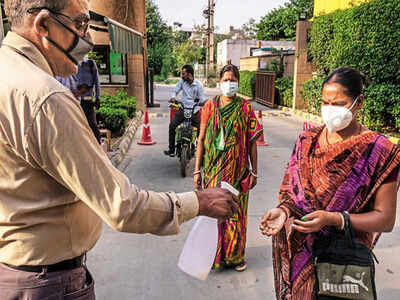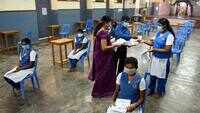
GURUGRAM: Rabiya Bibi, 35, arrived in the city from West Bengal with her husband and polio-afflicted son in 2010, hoping to find work as a domestic worker. Salaries, she had heard, were much higher than she could expect in her home state. And there was demand as well; people were moving fast into all those “big towers” that were fast filling up the city’s skyline.
In the next 10 years, Rabiya never had to worry about a job. There was always enough. If she lost one, she could get several others. Then came the lockdown this March. Two months on, Rabiya has found work only in one house. Her monthly wages have come down from Rs 10,000 to Rs 1,500. It’s hard, she says, to believe this is the same city.
None of the three families she used to work for in Sector 23 paid her April and May salaries. One of them called her back in the second week of May after the RWA allowed entry of domestic helpers, but they flatly refused to pay her for the months she didn’t work, she says. With the other two families refusing to hire her back, her monthly income has shrunk beyond her worst fears. And new employers are impossible to find.
“I am the only earning member in my family since my husband is unwell. I haven’t been able to pay the rent for the past three months, and the landlord has been asking for the money repeatedly, despite the government’s directive (to not ask for rent). I can barely afford food for my family now,” said Rabiya.
Her story is so similar to that of other migrant workers who were employed as house helpers in the city, many of whom left for their home states in despair, that it sounds like a twice-told tale. “We’ve had little or no income since March. Most households haven’t paid us. Many families in our neighbourhood are surviving on a single meal per day,” said Kajal Mahato, who is from Uttar Pradesh. She works in a high-rise building on Golf Course Road and lives in a jhuggi nearby. Like Rabiya, she, too, has lost two of her three jobs.
A survey in eight states by the Domestic Workers Sector Skill Council (DWSSC), a non-profit organisation under the ministry of skill development and entrepreneurship, reflected the serious concerns faced by this work force. Of the 200 domestic workers they spoke to in April, nearly 85% said their employers were not paying them for the lockdown period. Besides, 38% said they were facing problems in arranging food and 30% did not have enough money to survive the lockdown period. The survey was done across eight states — Delhi, Maharashtra, Madhya Pradesh, Assam, West Ben-gal, Bihar, Jharkhand and Tamil Nadu.
Maya John, convener of Gharelu Kamgar Union, told TOI that the number of people who paid their domestic workers through the lockdown months is very small.
“Many have asked them not to return to work, whereas, others are paying them less for the same amount of work. In some cases, even though they resume work, they get sent back because of a rumour that some maid has contracted the virus,” said John.
Kajal and Rabiya are among those who didn’t join the exodus of migrant workers because chances of finding work in Gurugram were better than at home when the lockdown was lifted. But with Covid-19 cases increasing, households have turned increasingly risk-averse and many have decided not to recall domestic staff to work despite restrictions on entry into housing societies considerably easing up over the last couple of weeks.
“It is not just that they have lost their jobs, they are also being discriminated against. There is a notion that they spread the virus because they aren’t as hygienic. In other cases, they are being judged for their religion. Many of them have been turned away because they were Muslim,” said Anita, who works with Gurugram Mahila Kamgaar Sangathan.
Their only safety net, the little savings they manage, is heavily dented and can’t sustain them for much longer. “There are no fixed wages for us and no laws that govern our work. If the government doesn’t step in and help us, many of us won’t be able to survive this crisis,” said 40-year-old Chandni, who works as a domestic worker in Sector 55.
(Additional reporting by Ambika Pandit)
In the next 10 years, Rabiya never had to worry about a job. There was always enough. If she lost one, she could get several others. Then came the lockdown this March. Two months on, Rabiya has found work only in one house. Her monthly wages have come down from Rs 10,000 to Rs 1,500. It’s hard, she says, to believe this is the same city.
None of the three families she used to work for in Sector 23 paid her April and May salaries. One of them called her back in the second week of May after the RWA allowed entry of domestic helpers, but they flatly refused to pay her for the months she didn’t work, she says. With the other two families refusing to hire her back, her monthly income has shrunk beyond her worst fears. And new employers are impossible to find.
“I am the only earning member in my family since my husband is unwell. I haven’t been able to pay the rent for the past three months, and the landlord has been asking for the money repeatedly, despite the government’s directive (to not ask for rent). I can barely afford food for my family now,” said Rabiya.
Her story is so similar to that of other migrant workers who were employed as house helpers in the city, many of whom left for their home states in despair, that it sounds like a twice-told tale. “We’ve had little or no income since March. Most households haven’t paid us. Many families in our neighbourhood are surviving on a single meal per day,” said Kajal Mahato, who is from Uttar Pradesh. She works in a high-rise building on Golf Course Road and lives in a jhuggi nearby. Like Rabiya, she, too, has lost two of her three jobs.
A survey in eight states by the Domestic Workers Sector Skill Council (DWSSC), a non-profit organisation under the ministry of skill development and entrepreneurship, reflected the serious concerns faced by this work force. Of the 200 domestic workers they spoke to in April, nearly 85% said their employers were not paying them for the lockdown period. Besides, 38% said they were facing problems in arranging food and 30% did not have enough money to survive the lockdown period. The survey was done across eight states — Delhi, Maharashtra, Madhya Pradesh, Assam, West Ben-gal, Bihar, Jharkhand and Tamil Nadu.
Maya John, convener of Gharelu Kamgar Union, told TOI that the number of people who paid their domestic workers through the lockdown months is very small.
“Many have asked them not to return to work, whereas, others are paying them less for the same amount of work. In some cases, even though they resume work, they get sent back because of a rumour that some maid has contracted the virus,” said John.
Kajal and Rabiya are among those who didn’t join the exodus of migrant workers because chances of finding work in Gurugram were better than at home when the lockdown was lifted. But with Covid-19 cases increasing, households have turned increasingly risk-averse and many have decided not to recall domestic staff to work despite restrictions on entry into housing societies considerably easing up over the last couple of weeks.
“It is not just that they have lost their jobs, they are also being discriminated against. There is a notion that they spread the virus because they aren’t as hygienic. In other cases, they are being judged for their religion. Many of them have been turned away because they were Muslim,” said Anita, who works with Gurugram Mahila Kamgaar Sangathan.
Their only safety net, the little savings they manage, is heavily dented and can’t sustain them for much longer. “There are no fixed wages for us and no laws that govern our work. If the government doesn’t step in and help us, many of us won’t be able to survive this crisis,” said 40-year-old Chandni, who works as a domestic worker in Sector 55.
(Additional reporting by Ambika Pandit)

Coronavirus outbreak
Trending Topics
LATEST VIDEOS
City
 Jyotiraditya Scindia and his mother test positive for Covid-19, admitted to Delhi hospital
Jyotiraditya Scindia and his mother test positive for Covid-19, admitted to Delhi hospital  Umar Khalid's aide Khalid Saifi taken under police custody for his role in Delhi anti-Hindu riots
Umar Khalid's aide Khalid Saifi taken under police custody for his role in Delhi anti-Hindu riots  Mumbai: 55-year-old senior BMC officer dies of Covid-19
Mumbai: 55-year-old senior BMC officer dies of Covid-19  All students to be promoted, Tamil Nadu Class 10 board exams cancelled
All students to be promoted, Tamil Nadu Class 10 board exams cancelled
More from TOI
Navbharat Times
Featured Today in Travel
Quick Links
Kerala Coronavirus Helpline NumberHaryana Coronavirus Helpline NumberUP Coronavirus Helpline NumberBareilly NewsBhopal NewsCoronavirus in DelhiCoronavirus in HyderabadCoronavirus in IndiaCoronavirus symptomsCoronavirusRajasthan Coronavirus Helpline NumberAditya ThackerayShiv SenaFire in MumbaiAP Coronavirus Helpline NumberArvind KejriwalJammu Kashmir Coronavirus Helpline NumberSrinagar encounter
Get the app



